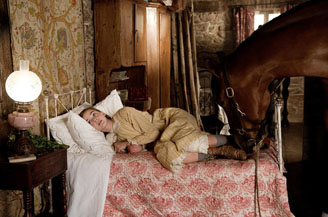|
|
Movie Review: War HorseBy Edwin DaviesJanuary 3, 2012
Many might be misled into thinking that War Horse is an uplifting film about the relationship between a boy and his horse. Whilst this does form part of the story, not to mention the weakest part of it, the tone throughout is far bleaker, and despite some moments of levity the film is committed to depicting war in a realistic and harrowing fashion. The scenes in which horses buckle and die as a result of over-work are particularly hard to handle, and the use of the animals throughout do an effective job of conveying the horrific toll of war in a manner which is not graphic. Whilst that might seem like a terrible compromise coming from the man who gave us the Omaha Beach opening of Saving Private Ryan, I think that it has been done in this manner so that children could conceivably see the film and learn about the horror and tragedy of war through the experiences of Joey. At its heart, War Horse is a fairytale, albeit a hard-edged one, which plays to both the best and worst of Spielberg's instincts. In its strongest moments, it has a quiet power to it that I couldn't help but find moving, particularly in the more gruelling moments in which Joey is forced to pull artillery, or during a late-film burst for freedom that winds up being one of the most breathless and exhilarating scenes Spielberg has ever directed. Whenever it turns towards the Albie/Joey relationship, both in the early scenes and towards the end, when the threads of the film come together somewhat awkwardly, whenever John William's lush score is over-used and whenever the characters in the film over explain every plot point, it becomes almost too sweet and sappy to swallow. However, it is an unabashedly earnest and heartfelt, not to mention odd, film designed to pull heartstrings, and I'd be lying if I said that it didn't pull mine.
|

|
|
|

|
Friday, November 1, 2024
© 2024 Box Office Prophets, a division of One Of Us, Inc.


